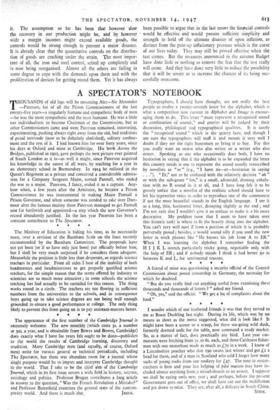A SPECTATOR 'S NOTEBOOK T HOUSANDS of old lags will be
mourning Alec—Sir Alexander —Paterson, for of all the Prison Commissioners of the last twenty-five years—a singularly humane and sympathetic body of men —he was the most sympathetic and the most humane. He was a little too individualistic to become Chairman of the Commission, but as other Commissioners came and went Paterson remained, innovating, experimenting, pushing always right away from the old, bad traditions of penal servitude (now to be definitely abolished), solitary confine- ment and the rest of it. I had known him for over forty years, since his days at Oxford and mine at Cambridge. His book Across the Bridges, published in 1911, gave perhaps the best picture ever painted of South London as it is—as well it might, since Paterson acquired his knowledge in the surest of all ways, by teaching for a year in an elementary school in Bermondsey. In 1914 he enlisted in the Queen's Regiment as a private and conceived a considerable admira- tion for a Company Sergeant Major, named Pannall, who ended the war as a major. Paterson, I fancy, ended it as a captain. Any- how when, a few years after the Armistice, he became a Prison Commissioner he was instrumental in making Major Pannall a Prison Governor, and when someone was needed to take over Dart- moor after the famous mutiny there Paterson managed to get Pannall sent for forthwith and appointed—a step which the new Governor's record abundantly justified. In the last year Paterson has been a constant contributor to The Spectator.
• * * *






























 Previous page
Previous page